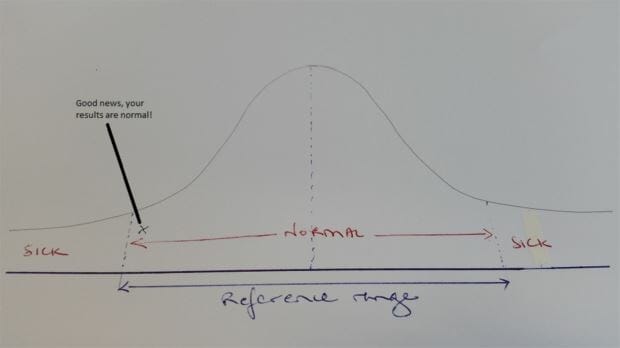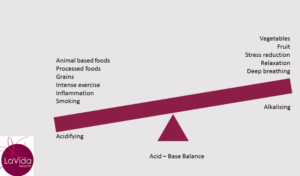Frequently, when people seek me out for naturopathic support, they have seen one or more doctors, had some pathology tests done and been told that all their test results are normal and there is nothing really wrong with them. And yet they still feel unwell. Perhaps they have vague digestive symptoms or they feel tired, or their not sleeping. Maybe they just don’t feel like themselves anymore. And so they come to me, seeking help to get to the bottom of their malaise.
In addition to taking a very detailed health history from top to toe along with dietary assessment and gaining an understanding of your lifestyle, occupation and environment, I will ask to see a copy of whatever test results you have. Then I will spend considerable time putting all the pieces of the puzzle together. It can be a complex process and it can take some time to build a full picture but I find it is the best way to really understand what is going on for you.
You are more than your biochemistry but let’s just focus on pathology tests for the moment.
What does a “normal” blood test actually mean?
Most pathology tests compare your result to a reference range. (E.g. your result is 16 and the reference range is 15-165 so your result would be deemed normal as it sits within the reference range). So, does this reference range actually reflect optimal health for you? Hmmm…maybe not.
The reference range is determined by the laboratory (and can therefore vary from lab to lab). Sometimes, their testing methodology can differ too (i.e. the same blood sample might get two slightly different results from different labs).
Hint: It’s always a good idea to get tests done at the same laboratory (and the same time of day) to ensure consistency of results.
The reference range for a test is calculated by taking an average (mean) of all the results for people tested (including the unwell people like you) for that particular test. The reference range is then generally calculated as two standard deviations from that mean (although it can differ for some tests). This range will result in 95% of the population having clinically “normal” results within the reference range. If you fall outside the reference range you might be considered to have disease worthy of treatment or further investigation.
So, do you think 95% of the population is “healthy”? Many experts would suggest we are not and I would agree but there is a lack of scientific evidence to determine what would be “healthy” in the context of certain blood tests. I think there are a lot of people with “normal” tests who are not optimally healthy but have results similar to the rest of an unwell population, thus putting them in the “normal” category. They may not have an identifiable disease or pathology but if they are towards either end of the reference range they may have less than optimal function of their biochemistry and they may well be heading towards a disease..
“Normal” is not the same as “optimal”.
What else could be going on with your pathology tests?
There are other reasons why your tests might not give you the answers you seek.
You only get answers to the questions you ask (a wise doctor once told me that).
In other words, if the wrong test is done you may not get the answer you need. Now this can be complicated. Your GP is required to work within a framework of testing. They have to be able to justify every test they order under Medicare based on their assessment of you. There are guidelines as to what they can and can’t request and these are based on what symptoms you present with so the more symptoms you report, the easier it is for your doctor to justify a more comprehensive list of tests. If those tests come back “normal” it might be difficult to justify further testing. Thyroid testing is a classic example of this.
Tests need to be assessed in the context of the individual
We can’t just look at a test result in isolation to determine if someone is healthy or not. We need to take into account their physical examination, current symptoms, past history and family history. The relevance of a particular test result needs to take these into account. (E.g. we need to consider the relevance of being a vegan or an omnivore when assessing iron levels. Or a family history of diabetes might make us watch your blood glucose numbers a bit more closely). We also need to take into account your sex (male or female), your age and even your body composition. The standard reference ranges don’t always take these nuances into account.
Tests are just one moment in time
Results can vary from day to day depending on a whole variety of factors. How you felt during the actual test, how hydrated you were, when you last exercised, when you last ate, how you slept the night before etc. can all affect your result on that day. It helps to understand the context of the actual test when assessing your test results. It can make a big difference. I use a questionnaire with my clients to help understand context.
My preference is for testing to be done in a fasted state (i.e. where you haven’t eaten for 10-12 hours) and ideally in a rested state (i.e. no high intensity exercise for at least 48 hours).
Evaluating trends in pathology tests
One of the things I do is summarise your results into a spreadsheet. This way I can study them going back over the years so I can see any trends that may be developing. Think about that example above where the reference range is 15-165 and your result is 16 and technically normal. If we look back through past tests and see that 5 years ago your result was 80 and it’s been gradually declining, perhaps that decline might explain your present symptoms. Why wait until you finally get an abnormal result of 12 to finally do something?
Looking at relationships between tests
One of the benefits of summarising all your tests is I get to look at patterns between tests too. Your body works very hard to maintain balance and harmony (called homoeostasis) so sometimes one system will work harder to compensate for another system that’s struggling. If we look at tests in isolation we might miss that but when I look at all your tests together I can potentially pick up certain patterns that are emerging. For example gradually increasing cholesterol can be a sign that your thyroid is not functioning at an optimal level. If we only look at cholesterol in isolation we might be missing an important clue.
Consider other functional testing
Many of the tests covered by Medicare are looking for disease or pathology. They don’t consider function. Poor function often precedes disease. So your tests come back “normal” because you don’t have any disease but they don’t really assess how your body is functioning.
There are a significant number of functional tests which can be done to look at your metabolism, digestion, hormone patterns and more. Many of these tests are well validated and extensively used by integrative doctors and naturopaths however, they aren’t covered by Medicare so your doctor may not suggest them or may not be trained in their interpretation.
They are not my first port of call (as they can be expensive and your basic pathology tests can provide a wealth of information when the time is taken to study them comprehensively) but sometimes they are warranted and can really make a difference to my approach to your treatment.
My blood tests are normal, what do I do now?
When you come to see me for a naturopathic appointment, I will most likely ask for copies of any pathology tests you have had done (for some of my clients we have over a decade of history). I will then study these in the context of all the other information you have provided me around your symptoms, lifestyle, work, diet etc. The goal is to find the reasons for your symptoms and put changes in place to help you feel healthy again.
Next time you get tests done and are told they are all fine, ask yourself if they have been considered in the light of the above information.





